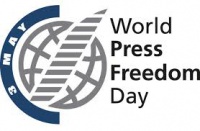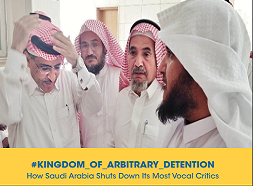Press Freedom Day in the Arab world: Alkarama pays tribute to reporters targeted for their work
As the world celebrates Press Freedom Day, many journalists and bloggers in the Arab world are paying a heavy price for their commitment to provide citizens in their countries and around the World with independent and thorough information.
Because reporting impartially on their acts and policies is seen by States in the region as a threat to their stability or sometimes simply as an insult to those in power, journalists and bloggers are targeted. Judicial harassment, arbitrary and secret detentions, torture, executions ...
Governments in the region use multiple means to shut down the voices of those who expose their abuses. In conflict-prone countries, reporters face even greater risk since they are victims of reprisals from all parties to the conflict. In a region were peacefully criticising state policies is considered a security threat, some journalists have been prosecuted under terrorism charges. Lastly, in a world marked with online information-sharing, States in the region have also been issuing severe cyber-crime laws criminalising peaceful online activism and reporting.
"Protecting press freedom is a duty for all of us because without independent reporting, it is virtually impossible to guarantee accountability of those in power and ensure that abuses do not go unnoticed" said Rachid Mesli, Legal director at Alkarama, "Today we pay tribute to all the courageous women and men who put their lives and freedom at risk to provide us with independent reporting".
For the past decade, Alkarama has been defending journalists and bloggers who were, and are still today, victims of these unacceptable and illegal practices by submitting on their behalf individual complaints to United Nations Human Rights Mechanisms and advocating for their rights. The following cases give a snapshot of a dire situation all across the region.
The gulf region is marked by extremely restrictive laws on press and publication and cybercrime laws designed to monitor and silence peaceful reporting, activism and debate on social media. It has been repeatedly used to arrest and detain secretly journalists and bloggers. In the United Arab Emirates, the latest case is the one of Jordanian journalist Taysir Hasan Mahmoud Salman was arrested by State Security Forces on 13 December 2015, and was secretly detained for over two months during which he was denied the right to contact a lawyer or his family. He reported later to his family that he was detained due to a Facebook post he published in 2014 in which he criticised the UAE's support for the Egyptian regime's policy toward Gaza. Until now, Taysir Salman has not been officially charged and the reasons for his detention were not disclosed. According to Taysir's family, he was threatened and pressured by the UAE authorities to force him to sign confessions. While Taysir was secretly detained, Alkarama sent his case to the United Nations Working Group on Enforced Disappearances (WGEID), which sent an urgent appeal to the State, requesting clarification. After he was presented to a judge, Alkarama also seized the UN Working Group on Arbitrary Detention (WGAD), requesting his immediate release.
In Yemen, the conflict worsened the already dire human rights situation, especially for those who report on violations committed by all parties to the conflict. On 9 June 2015, nine journalists who had previously documented human rights violations committed by the Houthi-Saleh Coalition were abducted from the Dream Castle Hotel in Sana'a by armed members of this coalition and detained in a secret location. The Yemeni Journalists Syndicate (YJS) issued several appeals asking the Houthi-Saleh Colaition to release them, but to no avail. In view of these facts, Alkarama called upon the United Nations to request the Houthi-Saleh Coalition to release them immediately or, at the very least, to disclose their whereabouts. To date, the Houthi-Saleh Coalition have refused to disclose the fate and whereabouts of the journalists.
In Kuwait, Dar Al Watan Journalism Printing and Publishing Company and its televised counterpart Dar Al Watan TV were shut down by the government respectively in March and July 2015, their premises where closed and their license to publish and broadcast abusively cancelled as retaliation for their independent editorial choices. Alkarama raised the attention of the United Nations Special Rapporteur on Freedom of Expression on the situation of both media companies asking him to intervene and ask the government to put an end to the reprisals against the media.
In the Mashreq region, conflict-affected countries Syria and Iraq remain among the world's most dangerous countries for journalists due to armed clashes and politically motivated violence as well as the repressive actions of the authorities. In Iraq, the recent closure of Al Jazeera's Baghdad bureau by the Iraqi Communications and Media Commission allegedly due to "inciting sectarianism and violence" is another attempt to repress press freedom. In Syria, were numerous journalists have been killed, Mazen Darwish, Director of the Syrian Center for Media and Freedom of Expression (SCM) and his colleagues Hani Al Zaitani and Hussein Ghrer were arbitrarily detained for more than 3 years. Arrested in a raid at their office on 16 February 2012 and charged with "publicizing terrorist acts" by the Anti Terrorism Court, they were released only after three years of arbitrary detention.
Countries such as Jordan and Lebanon, which portray themselves as journalist-friendly countries, are not exempt of violations either, with Lebanese journalist Rami Al Aysha arbitrarily arrested in August 2012, subsequently detained and sentenced by the military court for his independent reporting on arms trafficking in the region. In Jordan, the 2014 antiterrorism law punishes any speech deemed critical of the king, government officials and institutions, is used against the media and voices critical of the government, such as in the case of Eyad Qunaibi, sentenced to two years of imprisonment for a Facebook Post. Attacks on Free Press, opinion and peaceful assembly are systematic in Gaza and the West Bank too. This is the case of 34-year-old reporter at Al Majd TV Mohammad-Adeeb Ahmad Sulaiman Alqeeq who was arrested from his home on 21 November 2015 by Israeli soldiers and taken to the Al Jalameh prison, where he was subjected to periods of incommunicado detention and torture. Accused of "inciting violence through the media", Alqeeq remains since in administrative detention.
In Egypt, one the Arab countries where the situation is the most worrisome, the authorities have recently worsened their already heavy crackdown on independent media by prosecuting numerous journalists. This repressing culminated recently when police forces raided the Press Syndicate headquarters and arrested two journalists on 1 May 2016, for the first time since its creation. Dozens of journalists have been arrested for independently reporting on state policies and abuses committed by security forces have been imprisoned, under broad accusations including "spreading false news" and "undermining the State", such as journalist Abdullah Al Fakharani who has been sentenced to life in prison along with several other journalists in April 2014 .
In Sudan, the National Investigations and Security Services have seized many independent newspapers in recent years, in complete impunity and also judicially harassed independent journalists. In Djibouti, the authorities launched a repressive campaign against journalists ahead of the April 2016 presidential election leading to arbitrary arrest of independent journalists such as Mohamed Ibrahim Waiss who was arrested on numerous occasions in the past years.
In Algeria, Hassan Bouras a journalist and human rights defender, board member of the Algerian League for the Defence of Human Rights (LADDH), known for his criticism of the Algerian government and of the prevailing corruption among State officials has a long history of judicial harassment and retaliation for his work, the latest being a prosecution for "insulting the President and the military institution". On 2 October 2015 he was arrested for an umpteenth time and spent the following three months in pre-trial detention. An urgent appeal sent by Alkarama to the United Nations Special Rapporteur on the situation of human rights defenders on 5 October 2015. If he has been released after three months, he is still under prosecution and is at risk of being sentenced to a heavy prison sentence for his peaceful criticism and independent reporting.
In Morocco, journalist and activist Mustapha El Hasnaoui who was known for reporting human rights violations in the country, particularly following the Casablanca bombings of 2003, was sentenced on 11 July 2013 to four years in prison under the anti-terrorism law for his work. Alkarama referred his case to the WGAD which in turn asked for Mustapha's immediate release considering that he was detained for the sole reason of his reporting. Later, on 17 March 2015 investigative journalist Hicham Mansouri was arrested and sentenced on 30 March 2015 by the Rabat Court of First Instance to 10 months in prison and a fine of 40,000 dirham for "complicity of adultery". Alkarama believes that the journalist's right to a fair trial was seriously violated and that it is highly probable that the real reasons behind the charges against him were related to his activities as a journalist and activism within associations for the defence of human rights such as the "Association marocaine pour le journalisme d'investigation" (AMJI). Released on 17 January 2016, he will be brought again before judges on 23 June 2016 under charges including "undermining State security".
 Algeria
Algeria Bahrain
Bahrain Djibouti
Djibouti Egypt
Egypt Iraq
Iraq Palestine/Israel
Palestine/Israel Jordan
Jordan Kuwait
Kuwait Lebanon
Lebanon Libya
Libya Mauritania
Mauritania Morocco
Morocco Oman
Oman Qatar
Qatar Saudi Arabia
Saudi Arabia Sudan
Sudan Syria
Syria Tunisia
Tunisia United Arab Emirates
United Arab Emirates Yemen
Yemen Other Countries
Other Countries



